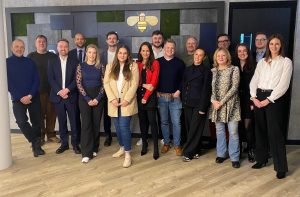Google begins drive to get Liverpool business online

THE managing director of Google’s UK business has set a target of conducting 1,500 one-to-one consultancies with Liverpool’s SMEs during its three-month drive to get more of the city’s businesses online.
The internet giant kicked off its campaign yesterday evening in the city’s Baltic Triangle area, pledging that its initiative will help smaller firms to grow much faster by embracing the internet at no cost to themselves. It has a juice bar that will move around the city-region with consultants offering businesses 40-minute sessions demonstrating tools to set up their own free website, or advice on using search and data tools to improve existing websites.
It is also meeting web developers around the city to discuss how Android and other tools can be used to boost their clients’ online presence.
Google kicked off a campaign to get around 1.5m UK businesses which do not have a web presence online around 18 months ago, but the Liverpool launch is the first time it has targeted activity on a particular city.
Managing director Matt Brittin said: “We were looking for a city that was entrepreneurial and had a good business community where we could work with partners, which is what we’re doing here,” he said.
He said that research showed that on average, firms with a web presence were growing four times faster than those without one, and that 17p in every £1 spent in the UK is now spent online.
“The internet economy is worth £100bn a year, which is bigger than the entire transport sector and the entire utilities sector. Not only that, in the total UK economy we’re a net importer. Online we export £3 for every £1 we import.
“We’re actually good at this stuff – we’re the no.1 country worldwide for e-commerce spend.
“Small businesses are powering that trend. That’s why we’re so passionate about this opportunity. The more businesses get online and have a go, the more opportunity there is for those businesses to find customers and compete in a global marketplace, not just a local one.”
He cited two examples of firms Google had worked with which had found an international audience for its products after developing their web presence – one was a tartan seller in Scotland which now exports 70% of its sales, and another was a Clitheroe-based company selling tattoo equipment which now exports to around 17 countries.
“We’ve got online guides for different types of business, whether you’re a plumber, B&B, a start-up or whatever. We hope we can engage with a lot of people in Liverpool and around the North West.”
Mr Brittin said that Google’s aim with the campaign was more about getting businesses to embrace the web rather than selling its own services, such as Google Adwords.
“If you look at what we do, all of our services are free to consumers and we are really about making the web a better place for consumers and for business. We’ve got a very long term view on that. We think an initiative like this will help people to use the web, and over time, we and other online businesses can make money from more people being online. But there’s no direct financial benefit to us.”








